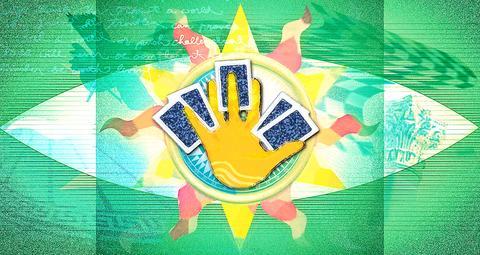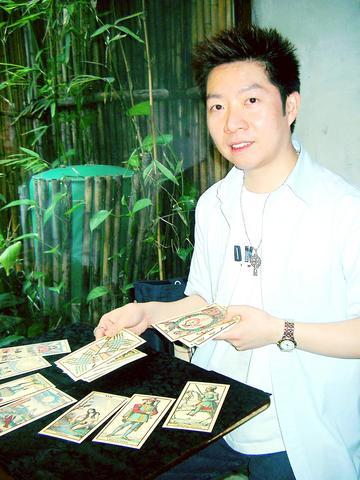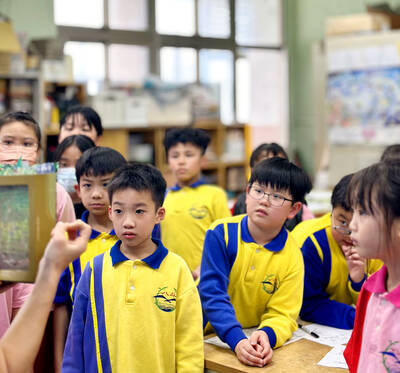Well-known TV anchor Chang Ya-chin (張雅琴) is on set and sits at a counter decorated with mystical symbols, asking Maurice (whose surname is Chen but he prefers his stage name), "so what do you see happening in the next Taipei mayoral election?" Maurice picks one card from a dozen cards spread out on the table and takes a look. Within seconds he's pontificating.
"Well, this is a tough one. The card refers to waiting, and uncertainty. This means Ma Ying-jeou (

The next question is: "Can you analyze these four people? Lien Chan (

PHOTO: YU SEN-LUN, TAIPEI TIMES
Tarot card reading used to make waves in publishing and TV media about five years ago when it was introduced to Taiwan. But horoscopes, Chinese divination and the Eight Diagrams are still the major tools of fortune-telling in popular culture today. Now, 30-something Maurice -- who is seen as a bit of a wizard in celebrity circles in both China and Taiwan -- is about to change all that.
Asia Plus (東風衛視) -- a satellite TV channel in Taiwan, Hong Kong and China that broadcasts Chang's Inside Copy (
Fortune-telling programs have become popular on Taiwan's cable channels. They usually follow a talk-show-like format, with two hosts chatting to one or two fortune tellers. Such shows cost little to produce and most of this money goes to the "experts."
On Eastern TV channel (東森電視), there are two popular fortune-telling shows. Lucky Strike(開運鑑定團), airs five days a week and Match Wonderland (友好星樂園) goes out once a week. The former has a rating of 1.12 percent, a success for cable TV programs. The popularity of fortune telling has also got Asia Plus interested in producing similar programs.
"Indeed, fortune telling is now a hot topic among audiences. And now we are planning a new fortune-telling show for Maurice," said Joshua Shao (
"He's so good at it, like he's got a gift. He can sense something normal people can't," said Akai Wu (
"It's magical when you see him reading for others. He can sense the person's magnetic field within a few seconds. And from one single card, you can probably read many different things. But Maurice can see something totally related to that person," Wu said.
"One time, a girl came to him asking about her boyfriend," Wu said. "But Maurice read that it was a love triangle. The girl finally admitted that she was the third party," Wu said.
Winston Chao, the actor best-known for his role as Sun Yat-sen in The Soong Sisters, has now shifted his career focus to China.
"I don't usually believe in horoscopes or tarot cards. So I asked Maurice which of three TV dramas I was to star in would be a success. He picked the one I did not expect to be good. And that turned out to be one of the best-selling dramas on Central Television Station in China," Chao said.
One of the reasons Maurice is so popular among Chinese
celebrities is, perhaps, because he has a Chinese way of reading tarot cards.
"When it comes to psychic reading or fortune-telling, Chinese people tend to be very utilitarian. They want practical answers, very clear-cut, black-and-white solutions. They're not interested in knowing about their egos or understanding more about their own psyche," Maurice said.
Some of Maurice's clients ask detailed questions about their investments. "I need to tell them how many US dollars and how many euros the client should buy. Or, how much he should invest in a new projects or whether he should buy new stock, and when he should put the money in," Maurice said.
Maurice said he hadn't set out to be a fortune teller.
"My first deck of tarot cards were bought from a New Age bookstore in New York 10 years ago. It was just for fun," he said. Maurice was at the time working as a visual arts consultant for the New York City Ballet. He also became the assistant for Tibetan expert and religion professor Jeffery Hopkins at the University of Virginia.
"From the time I began reading cards for friends, the response was very positive. Then I tried to prophecy the US presidential election. It was when Clinton won again, , as my reading suggested, that I began to become more confident about my abilities," he said.
Maurice began charging people three years after he taught himself to read the cards and in two months he had 200 clients. He later studied at Findlay College in London, the school famous for studying mysticism.
"[The clients] were mostly in the entertainment business, asking about relationships. There were also record company executives asking when they should set the release date for their records and whether they should spend more money on marketing?" Maurice said.
Though Maurice would not confirm the cost of his readings, in the early stages of his career he charged NT$5,000 for a question, with a session lasting up to 40 minutes. Prices went up when he began his business in Beijing.
"RMB10,000 (US$1,200) for a question is a rock-bottom charge for him," said agent Wu. "Compared with many so-called fortune-telling "masters" in Beijing, Maurice's price is very reasonable," he said. "Some masters even ask their clients to give a red envelope when their son is getting married, or when the master's family is moving."
"He has the gift. And the contents of his readings are very solid," said Peter Dernbach, of legal firm Winkler Partners, who has known Maurice as a friend since his college years.
"I would not probably pay that much for a tarot card reading. But the value of such a reading lies in the hearts of the person asking. They are willing to pay because they think it's helpful for them," Dernbach said. "Besides, Maurice is a very balanced person. He knows what he can do or what he can't."
Now, Maurice is ready to host his own TV show.
Those who are curious about Maurice's readings but cannot afford his high prices, the new TV show sounds like a good idea.

May 26 to June 1 When the Qing Dynasty first took control over many parts of Taiwan in 1684, it roughly continued the Kingdom of Tungning’s administrative borders (see below), setting up one prefecture and three counties. The actual area of control covered today’s Chiayi, Tainan and Kaohsiung. The administrative center was in Taiwan Prefecture, in today’s Tainan. But as Han settlement expanded and due to rebellions and other international incidents, the administrative units became more complex. By the time Taiwan became a province of the Qing in 1887, there were three prefectures, eleven counties, three subprefectures and one directly-administered prefecture, with

It’s an enormous dome of colorful glass, something between the Sistine Chapel and a Marc Chagall fresco. And yet, it’s just a subway station. Formosa Boulevard is the heart of Kaohsiung’s mass transit system. In metro terms, it’s modest: the only transfer station in a network with just two lines. But it’s a landmark nonetheless: a civic space that serves as much more than a point of transit. On a hot Sunday, the corridors and vast halls are filled with a market selling everything from second-hand clothes to toys and house decorations. It’s just one of the many events the station hosts,

Two moves show Taichung Mayor Lu Shiow-yen (盧秀燕) is gunning for Chinese Nationalist Party (KMT) party chair and the 2028 presidential election. Technically, these are not yet “officially” official, but by the rules of Taiwan politics, she is now on the dance floor. Earlier this month Lu confirmed in an interview in Japan’s Nikkei that she was considering running for KMT chair. This is not new news, but according to reports from her camp she previously was still considering the case for and against running. By choosing a respected, international news outlet, she declared it to the world. While the outside world

Through art and storytelling, La Benida Hui empowers children to become environmental heroes, using everything from SpongeBob to microorganisms to reimagine their relationship with nature. “I tell the students that they have superpowers. It needs to be emphasized that their choices can make a difference,” says Hui, an environmental artist and education specialist. For her second year as Badou Elementary’s artist in residence, Hui leads creative lessons on environmental protection, where students reflect on their relationship with nature and transform beach waste into artworks. Standing in lush green hills overlooking the ocean with land extending into the intertidal zone, the school in Keelung